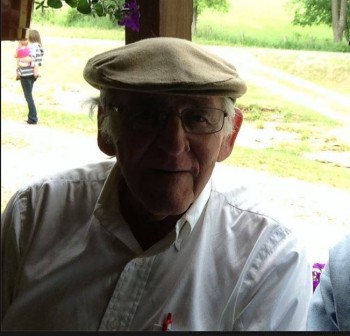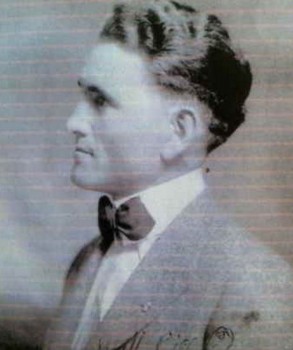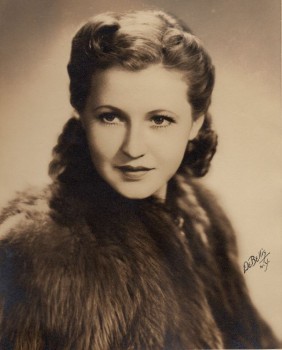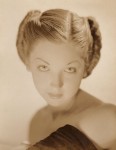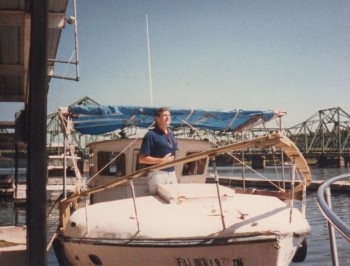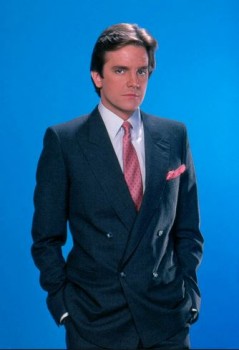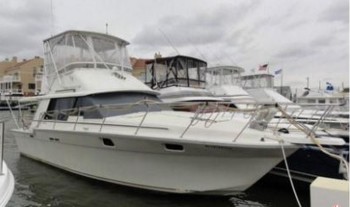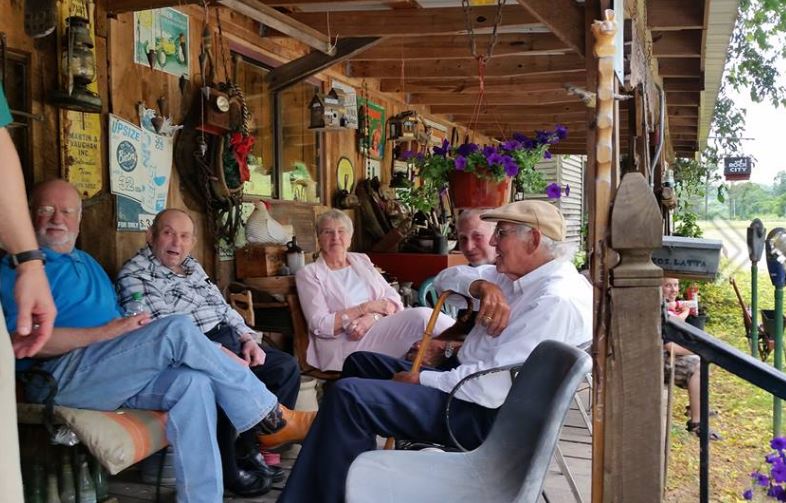“If you have time, I’ll tell you a good Lane Davies story.”
“Well, if it’s good, I’ll take time,” I said.
I was visiting with Mr. James “Buddy” Pigg in an 1880s schoolhouse on Mingo Branch. Every year, Mr. Buddy graciously invites me to his family’s reunion in Sante Fe, Tennessee, held on the homeplace of his second cousin Charles.
The guy he mentioned, the actor Lane Davies, is a friend of mine and the best friend of Mr. Buddy’s nephew Clark Tucker. Clark, appearing in the doorway, occasioned Buddy’s comment.
Clark’s mother (and Buddy’s sister), Dorethe “Dot” Tucker, taught Lane the performing arts at Middle Tennessee State University, where the Tucker Theater now stands in commemoration of Dot and husband Dr. Clay Tucker.
In fact, I first met Lane Davies at MTSU when he was under Dot’s tutelage. In the winter of 1971, he was a college actor playing the lead in Lion in Winter and I was a redneck kid who had ridden a school bus from Columbia to see a play.
Dot is still with us. She is 96 years old, the eldest of three children born to Mr. Will and Miss Louise Walker Pigg of Columbia, Tennessee, her siblings being “Dub” (William, Jr.), and Buddy. They come from good stock.
Mr. Will, born in 1888 (just a few years after the schoolhouse was built), was raised near Sante Fe on a prosperous livestock farm on Knob Creek Road, not too far from Charles’s property. When he was in his twenties, he ventured into the big town of Columbia and went to work in a barber shop on the square, having had years of experience as a front porch barber on the farm.
Luckily for him, he had an enterprising nineteen year old sister-in-law, Thelma Waters Pigg, who ran a cigar stand at the Bethel House Hotel. Plenty of traveling salesmen would lodge there and, whenever a drummer needed a haircut and a shave, she would direct them to “the best barber in town” – her brother-in-law.
One drummer was mightily impressed by the way Will comported himself, for he was an innately dignified young man.
“You’re too good to be cutting hair,” the man counseled. “You ought to go into some kind of business.”
The salesman looked across the square and gazed upon the Adkinson Brothers Men’s Store.
“The man that runs that place is nearing 70 years old. He’s a widower who lives in Miss Johnson’s boarding house. He doesn’t have a family. You ought to buy into his business, then over time, buy him out.”
That sounded like a good plan except that Will didn’t have much money. “I can’t afford to do that,” said Will.
The drummer studied him for a moment, then said, “I can.”
He then proceeded to bankroll Will in the enterprise that began as Adkinson and Pigg, then evolved into Adkinson & Pigg Brothers (with brother Maury), then Pigg Brothers (after Mr. Adkinson was bought out), and finally Pigg & Parsons.
In time, Mr. Will had a parting of ways with his older brother Maury.
Buddy told me about it:
“Maury liked to take a drink on the job and my daddy couldn’t abide that. You wouldn’t know anything about men’s merchandising, but the smallest men’s shoe ever sold at Pigg & Parsons was a size 7.
“Curiously, there was a box on the shelf which held a size 6A. That box may still be in that old building – because no man ever bought a size 6A shoe.
“That’s where Maury kept his bottle.”
After Maury departed, Mr. Will walked across the street to the W. W. Evans Men’s Store where he hired their ace salesman, the eternally ebullient, Clifford Parsons.
Mr. Clifford was invited by Mr. Will to buy into the store and so became a full partner.
Pigg & Parsons was a gold mine. It was one of the finest men’s stores in the South, carrying the very best brands. It was the first store in the South to sell Hart Shaffner Marx suits, and John Hart called Mr. Will every Christmas from Chicago to wish him a happy holiday.
Mr. Will also was the first in Middle Tennessee to sell shirts with attached collars — Arrow shirts by Cluett, Peabody and Company; and, during an era when men wore hats, the store sold a blue million J. B. Stetsons.
Additionally, there was a standard of professionalism about the staff, which was a bar set high by Mr. Will. Salesmen at Pigg & Parsons were cast as carefully as a Hollywood movie, with their neat haircuts, impeccably matched crisp shirts and ties, shined shoes, and their tape measures hanging around their necks.
It was Mr. Will’s dream that family would carry on his business. He sent Dot to Ward-Belmont School (now Belmont University), which was then an all-girls school. She reported that the girls were so rich, “They throw their undies away after one wearing and buy new ones.”
After transferring to Martin, she became involved in dramatic arts, then announced to her father that her cousin Dennie Grace and she would like to go to New York to study at the American Academy of Dramatic Arts.
Mr. Will told her, “That’s fine, but if you can’t make a living at what they teach you, don’t come back home.”
She studied at the Academy from 1939 through 1941, when she married Naval Academy graduate Houston Clay Tucker, Jr. He served on destroyers and submarines during World War II, then participated in the first nuclear bomb tests at Bikini Atoll in 1946 before retiring from the Navy…and going to work for Pigg and Parsons.
Incidentally, Dennie Grace made it to Broadway, then married a ludicrously wealthy manufacturer of post-war metal kitchen cabinetry, Philip Duboff. They had homes in Stamford, Connecticut and Palm Beach, Florida.
Will’s second child, Dub, enrolled at Vanderbilt in 1940 but deferred his college studies in favor of volunteering for the U. S. Army Air Force in World War II. After WWII service, he finished his degree at Vanderbilt where he met and married Miss Beverly Johnson of Columbia. Then, when the Korean War broke out, he was recalled to service. Finally, in 1950, he returned home to join his father in the business. He became president of Pigg & Parsons and shepherded its expansion into a four-store corporation.
Buddy was a good high school basketball player who graduated the year Dub came back from Korea. He enrolled in Vanderbilt and hated it the whole two years he was there. It was way too liberal a place for him. His big sister Dot was finishing up her studies at MTSU, so there is where he transferred, and there is where he met, courted, and married a local beauty, Miss Nancy Harris.
In 1954, he was drafted and assigned to the Army Signal Corps. Nancy and he lived in France for two years while he served as top sergeant and comptroller on a Colonel’s staff.
The whole time he was in France, Clay Tucker was writing him, telling him he couldn’t wait for him to get home. Clay had inherited the bookkeeper’s job when long-time employee Bob Petty passed away – and Clay hated it. He had been driving back and forth from Columbia to Nashville working on his Ph. D. in English from Vanderbilt and planned to go into teaching. Dot would finish her degree about the same time.
When Buddy came back in 1956, Clay gave him a thirty-minute orientation to the ledgers and literally handed the books to him.
“I can’t remember all this,” said Buddy.
“I just copied what Bob Petty did, you just copy me,” said Clay. Then he said goodbye and left the store, never to return as an employee.
Clay went on to become the Dean of Liberal Arts at MTSU while Dot became the legendary chair of MTSU’s Drama Department. In the late 1960s and early 1970s she cast a tall young man from Dalton, Georgia in several plays. His name was Lane Davies.
“Lane isn’t in this story physically, but he figures in it prominently,” began Buddy.
The time of the story is December of 1981. The place is Anchor High Marina on the Cumberland River northeast of Nashville in Hendersonville, Tennessee. Buddy kept a 34-foot boat at Anchor High, which was owned by Irby Mandrell, daddy and business manager to country music singer Barbara Mandrell. In fact, Barbara’s 85 foot ocean-going yacht was parked right next to Buddy’s slip.
Buddy had a friend Herbert Clark who owned a dinner club outside the Columbia city limits. Herbert loved the water. In fact, as a young man, he had been mechanic on river barges.
Almost every weekend you could find Herbert in the company of his friend Dr. Nickie Holland, at Rock Harbor Marina, down river from Hendersonville, where Dr. Nickie kept a nice boat. Both men were friends of Buddy’s and, invariably, they would drop by to see him. Usually, it was to borrow chairs and cushions, because they were real bad to forget their own and leave them at home.
One morning, Dr. Nickie and Herbert pulled up to Buddy’s boat and they were all bummed out. It seems that Jim Young, the man who ran Rock Harbor, had sold a 34-foot Silverton to a man who wanted it delivered to St. Petersburg, Florida. Dr. Nickie and Herbert had volunteered to pilot it down to him but, now it turned out, that Dr. Nickie had an important obligation that would keep him from the trip – a 1,700 mile journey that likely would take several weeks.
Herbert asked Buddy if he would go with him and, Buddy – a great fan of Samuel Clemens literature – jumped at the chance. It sounded like a grand adventure.
Buddy was one of the greatest men store salesmen of all time. He looked like a young Gary Cooper. He knew the clothing business inside and out. He was a very charming, quick-witted raconteur…but, the truth of the matter was, he hated working indoors. To him, it was like being in jail. He was always in his element walking behind his champion Beagle rabbit dogs or his champion English Setter bird dogs or riding one of his blue ribbon Walking Horses, or driving a tractor.
“I came back home and worked in the business because my daddy wanted me to,” he said. “And I would do anything for my daddy. He was the greatest man I’ve ever known.”
After weeks of planning, Buddy and Herbert embarked from Rock Harbor in the dark of night, on January 1, 1982.
This is Buddy’s story:
It was a brand new boat, a 160 horsepower single screw. She had a roomy salon with wet bar, sink and ice maker, a nice stereo system, and that’s where I had my battery-operated TV. There were two staterooms, two heads with vacuflush toilets and showers, a down galley with separate dinette, fully enclosed sundeck and flybridge, and dual helm stations. It featured a reverse cycle air conditioning and heating unit and it boasted radar.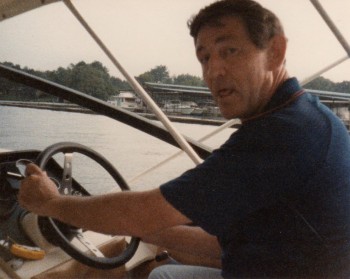
It was more comfortable at the cabin helm and I kept the television running nonstop to keep from dozing off. Herbert and I had done a lot of boating but we were pretty green on the big water. I had to watch what I was doing with that single screw. At full throttle, maneuvering is simple but reducing speeds throws you to the elements. With a single screw, turning the prop doesn’t redirect thrust, so you’re counting on a little stick in the water. Moving forward, a portion but not all of the prop thrust is redirected by the rudder. In reverse, its worse.
In the daytime, soap operas came on and, even before the trip, I had gotten interested in “Days of Our Lives” because Lane Davies was in it. He had been playing the part of Dr. Evan Whyland since summer and my daughter Lisa was crazy about him. She started watching it, then she got me hooked on it.
Evan Whyland practiced medicine at Salem University Hospital and he had a girlfriend named Sandy Horton, even though he was once believed to be the biological father of Sandy’s cousin Sarah. Later, it was found out that Dr. Neil Curtis had been a sperm donor for Sarah’s momma Maggie. It was a real interesting show.
After a few hours, we started getting low on gas, and over a big hill, I could see the lights of Cairo, Illinois. I started looking for a marina. I found one.
We pulled alongside a dock and read a big red and white sign that said, “NO TRESPASSING. PRIVATE PROPERTY. NO TYING OFF. NO LOITERING. NO DOCKING. VESSEL MAY BE REMOVED AND STORED AT BOAT OWNERS EXPENSE. POLICE MAY BE NOTIFIED.”
I looked at Herbert and Herbert looked at me. We were in a fix.
“I’m hungry,” said Herbert. “Let’s find a place to tie up and go find a Mexican joint.”
Herbert was a nut about Mexican food. Like I say, this was the early 80s and Mexican places were still a new thing. Herbert had recently discovered one, and he was instantly a burrito junkie.
“We’re going to have to find the man who owns this marina,” I said. “And if he’s not ready to unlock those pumps, I’m ready to use this pistol to persuade him.”
I reached in my duffle bag and retrieved my little dog-trainer .22 revolver. I stuck it in my jeans pocket. I didn’t want to resort to violence but I was prepared to scare somebody really bad.
I prowled the banks until I found an old dredged-up car we could tie up to. We did so, then we put on our cleanest shirts and began climbing the high, muddy banks of Cairo, Illinois in the dark.
We found a place where a lot of old tires and mattresses had been dumped into the river, so we climbed up the vertical junkyard and managed to stay fairly tidy. Yet, it still was an ordeal. We were huffing and puffing and grunting and cussing all the way up the bank.
When we got to the top, we discovered we had climbed to the very spot where a paved road ended, which would lead back into town. Bordering the road on both sides were sidewalks and two rows of old tin-roofed shacks.
As we began our expedition, we discovered a man sitting on a porch in a wheelchair at the second shack on the left. He was missing both legs and he was drinking a beer.
“I was wonderin’ if y’all were gonna make it,” he said.
He had heard our struggle.
“You don’t know where we can find a Mexican restaurant, do you?” asked Herbert.
“Sure do,” replied the man. He pointed down the road. “Just stay on this street and you’ll run right into it.”
“Let me ask you something,” I said. “That’s a public marina down below. Why does it have a No Trespassing sign on it?”
“Winter. Every marina down the river will be wearing that sign. They close up on January one. It’s a liability thing. If you break your neck on the dock, you can sue ‘em. So they put up them signs.”
I looked at Herbert and Herbert was looking at the ground. We were in a tighter fix than we ever figured.
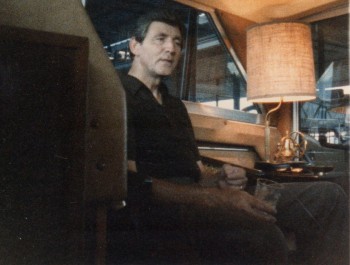 “Why don’t you boys have a beer with me, before you travel?” asked the man.
“Why don’t you boys have a beer with me, before you travel?” asked the man.
I knew Herbert wanted to find that Mexican place really badly but the man had been so nice I felt like we needed to take him up on his hospitality.
“That’s an excellent idea,” I said.
“Just go through the house to the back room and there’s beer in the refrigerator,” said the man. So Herbert went into the house and I could hear him open the refrigerator door.
“Mister, you ain’t got but two bottles in here,” called out Herbert. “We don’t want to drink all your beer.”
“I’ll get some more,” he said. “I’m glad to have company.”
So we drank beer on the porch and visited awhile. We found out he was a Vietnam vet but he had lost his legs to diabetes.
“You don’t happen to know where the owner of this marina lives, do you?” I asked.
“Sure do,” he said. And he gave us directions and the man’s name.
After a short while, we finished our beer and I offered to roll our host down to the restaurant.
“That’s mighty nice, but I just ate. Y’all go on and enjoy yourselves,” he said.
So we bid him adieu and went in search of the café.
After dinner, we followed our friend’s directions to the house of the marina man. I knocked on the door and, after awhile, a man appeared. His wife had followed him and stood behind him. I could hear the nighttime television soap opera “Falcon Crest” blaring from the television in their den.
“What do y’all want?” asked the man brusquely.
“We’ve got a problem. We’re delivering a yacht to St. Petersburg, Florida and we’re running low on gas.”
“The marina’s closed for the winter,” said the man.
“I understand that now but we didn’t have that information when we left Nashville. We’re in a real predicament and we really would appreciate your help.”
“I’m sorry. I can’t help you,” said the man.
I could see his wife’s hair rollers and eyeballs over his left shoulder and that blaring TV was blasting a loud cat fight between Jane Wyman and Lorenzo Lamas.
Just as I was feeling for my .22 in my pocket, a thought struck me like lightning.
“You know, I’m not so concerned about being stranded in Cairo as I am losing my generator power, and if I lose my generator, I’m going to miss out on my soap opera.”
“Soap opera!!!?” said the man.
“Soap opera?” said the woman. She came from behind her husband.
“Yeah,” I said. “I’ve been following ‘Days of Our Lives’ and I’m dying to find out if Evan Whyland is really Sarah’s daddy or not.”
“Evan Whyland!? He’s my favorite!” blurted out the woman.
“Did you know that the man who plays Evan Whyland is a good friend of mine?”
“WHAT!?” shrieked the woman.
“Oh, yeah. My sister, Dorethe Tucker, taught Lane Davies all he knows about acting at Middle Tennessee State University.”
“You know Lane Davies?” asked the woman.
“I’ve known him since he was eighteen years old. He’s a nice young man from a good family in Dalton, Georgia.”
“I heard he was from Dalton!” said the woman.
The whole time her husband was looking at us like he was a bull in a beauty shop.
She turned to him and looked him straight in the face. “You get these boys some gas!” she commanded.
And he didn’t protest. He rather begrudgingly shuffled to the back of the house to fetch a coat.
“Let me ask you something,” I said to the woman. “In a hundred miles or so we’re going to be in the same shape we are now – out of gas. Do you anybody down river who can help us out?”
“I sure do!” she proudly replied. “In about a hundred miles, there’s a woman who runs a boat dock and her and me talks soap operas on the phone everyday. If you tell her you know Lanes Davies, she not only will sell you gas, she’ll fix you dinner!”
And the woman did! In fact, we made it all the way down the Mississippi River, through Lake Pontchartrain, and into the Gulf selling that same old story for gasoline. In the meantime, we made Lane Davies the most famous actor on our Southern waterways.
As we were walking back to the boat, I told Herbert I wanted to stop in a convenience store and buy some beer and snacks for our friend back at the shack. I went in and bought a case of beer, and several bags of chips, and dips.
The man in the wheelchair was simply thrilled to see us and astounded by our largesse.
“Y’all are the nicest folks I’ve met in a long time. You know, I don’t get much company,” he said.
“Well, we enjoyed meeting you,” I said. “And you really did us a good deed.”
Then a sort of sheepish blush appeared on his face.
“I wonder if you’d do me a great favor?” asked the man.
“I will, if I can,” I replied.
“Could you…would you…play Chinese Checkers with me?”
I stole a glance at Herbert and I could see he didn’t want to stay.
“Why, that’s the least I can do,” I said. I didn’t look back at Herbert but I could hear him shuffle off the porch.
So I played a game of Chinese Checkers with the man.
Many an adventure followed that evening as I piloted the single screw through treacherous waters, particularly on Lake Pontchartrain. The voyage took us 42 days.
And we ate Mexican food every night.


